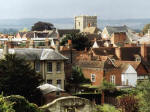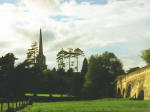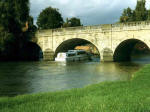In March 1934 while on a
tour to Great Britain and South Africa, the Harrises spent a few days
holidaying in the Cotswolds at the Bull Inn at Fairford, between Oxford
and Gloucester. Local Rotarians were unaware of their presence until
Paul Harris went into a bank to change some money.
 Members
of the Cirencester Club visited the Bull, and one, a draper called
Leach, offered to drive the Harrises to see the English Wallingford.
As Paul wrote in his diary:- Members
of the Cirencester Club visited the Bull, and one, a draper called
Leach, offered to drive the Harrises to see the English Wallingford.
As Paul wrote in his diary:-"I was interested in Wallingford
because I was brought up in
Wallingford, Vermont, a beautiful little
village in the Green Mountains. It was a long but interesting drive
(about 30 miles).
 On
arrival at the quaint little city we went at once to the church
which occupied a position on the public square. While walking about we
met an English gentleman of about my age. He volunteered some
information and being thereby encouraged, I asked him what other places
of special interest had best be visited. He answered, 'The
house of William Blackstone stands on the banks of the Thames. I
suppose you know who he was.' With high enthusiasm I said that I
certainly did; that his commentaries occupied an honored position in all
law libraries in America. On
arrival at the quaint little city we went at once to the church
which occupied a position on the public square. While walking about we
met an English gentleman of about my age. He volunteered some
information and being thereby encouraged, I asked him what other places
of special interest had best be visited. He answered, 'The
house of William Blackstone stands on the banks of the Thames. I
suppose you know who he was.' With high enthusiasm I said that I
certainly did; that his commentaries occupied an honored position in all
law libraries in America.
Then something happened, the reason of which I could not at the time
understand. Like a bolt out of a clear sky he shot out this remark;
'That is just like you Americans. We give you the best we have and
then you come around with your hands out.'
At a loss to find better words, I inquired with considerable
asperity, 'Have you ever been to America, sir?' and he said 'No'. I
said, 'What a pity! If you will come to Chicago, I will show you a city
not one tenth as old as yours. We have a population of three and one
half million people and we have already built four great universities.'
My wife's embarrassment was painful, but Leach laughed audibly and
ejaculated, 'Lovely, lovely!' Our guide looked at me quite seriously and
then astounded me again by saying, 'Did you say that you wanted to look
around? Come along with me. I will show you the interesting sights of
the town.' He was true to his word. No one, I am convinced, could have
done the job better.
As Jean and I were about to leave him to have a cup of tea, he said,
'Come and have tea with me.' I said, 'No, please come with us.' He was
not to be denied and he led us out of the business section to a
residential district along the Thames embankment, pointing out the
Blackstone homestead as we passed. |
The rain was coming down
copiously and I will admit that I was perplexed at the whole business.
What circumstances had been responsible for the sudden change of
demeanor of this strange person?
I was not quite certain that he was not intending to have us all
'pulled' on a charge of lese majesty or something worse.
We eventually halted at the front door of a mansion inscribed
'Cromwell Lodge'.
 Our leader opened the door unceremoniously and
admitted us. We passed through the hallway and out to a garden backing
on the river. The view up and down across into Staffordshire (actually Oxfordshire) was of itself worth a long journey. A
bridge, part of which
was Norman, could be seen in the distance. Our leader opened the door unceremoniously and
admitted us. We passed through the hallway and out to a garden backing
on the river. The view up and down across into Staffordshire (actually Oxfordshire) was of itself worth a long journey. A
bridge, part of which
was Norman, could be seen in the distance.
Our eccentric host then invited us into a spacious drawing room and
ordered tea. At this juncture a lady entered, whom our host introduced
as Mrs Ponking, his wife. If she was annoyed by the unexpected presence
of strangers, she had an admirable faculty of concealing her feelings.
For all I could see she was as much interested in the adventure as her
remarkable husband. Manifestly he had done the same thing before.
Conversation flowed freely in the warmth of the fireside and our host
agreed to accept a picture of my own beautiful Wallingford which I
promised to send him. I was in fact congratulating myself in the thought
that all unpleasantness was past, when suddenly Mr Ponking ejaculated:
'I shall never go to America.' It was somewhat startling, but I realized
that there was no accounting for folks and that after all it was my
host's privilege not to go to America.
After I had delivered myself of this ponderous thought, conversation
turned into pleasant channels again. When we left his home, Mr Ponking
went with us, somewhat to the surprise of his good lady, but perhaps she
would have been even more surprised had he not surprised her. Surprises
were manifestly the order of the day in Mr Ponking's household. He took
us to a book store, bought us a book on Wallingford, disappeared then
re-appeared only to say, 'I shall never go to America.' Then he scudded
away through the rain and falling darkness into a mammoth department
store, the facade of which bore the legend 'Ponking and Co.' My first
impulse, of course, was to enter in hot pursuit of the fleeing
Englishman, sieze him by the collar, drag him out of his 'sanctum
sanctorum', ignore his protests and forcibly take him to America, but on
more mature consideration concluded to let him have his own way about
it.
The Wallingford incident may seem like a fairy tale, but it is not;
it is true as above related."
From 'A visit to Great Britain and South Africa' by Paul
Harris 1934, unpublished.
Basil Lewis
|

